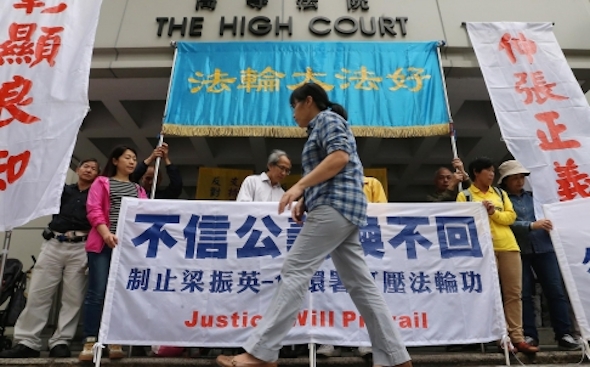Removing Falun Gong banners ‘breached right to free speech’
South China Morning Post
Falun Gong practitioners say displays taken down by government officials during ‘poster war’ were political speech and protected by law
By Austin Chiu

Two Falun Gong members had their constitutional right to freedom of expression breached when Food and Environmental Hygiene Department officers removed banners the group displayed on the streets, their lawyer told the High Court yesterday.
Hung Shui-fung and Chee Fei-ming are seeking leave to apply for a judicial review of the department’s decision in April last year to remove 130 banners and 484 display boards put up by the spiritual movement. The department said the group failed to obtain permission before putting up the displays.
The removal of the banners came against the backdrop of what was dubbed a “poster war” between Falun Gong practitioners, protesting against what they say is the persecution of followers on the mainland, and the pro-Beijing Hong Kong Youth Care Association. The government stepped up enforcement of rules on unauthorised banners following a rise in complaints when Youth Care Association members put up scores of banners in tourist areas, often covering Falun Gong material.
Lawyers for Hung and Chee told the court Falun Gong members had exercised their right to demonstrate at various locations in the city for 12 years.
Paul Harris SC, for the pair, said protesting against the persecution of Falun Gong practitioners was political speech and therefore protected by the Basic Law and the Bill of Rights.
The court heard that, in removing the banners on April 24, the department invoked the Public Health and Municipal Services Ordinance, which states that no bill or poster should be displayed on government land without its written permission.
But Harris said a blanket requirement for permission to display banners was not compatible with the right to free speech.
He argued that the requirement should not apply to banners of protest, except in circumstances where banners endangered road safety or caused an unreasonable obstruction.
According to documents filed by Harris with the court, there were just five public complaints about Falun Gong banners before June 2012. In November 2012, when the Youth Care Association started displaying anti-Falun Gong posters, there were 600 complaints about Falun Gong posters, with a further 110 in April last year.
Opposing the application, Johnny Mok SC, for the department, said the requirement for written permission was to ensure that the display of banners was under some kind of control.
The hearing continues today before Mr Justice Jeremy Poon Shiu-chor.
Founded in 1992, Falun Gong attracted tens of millions of followers on the mainland before it was banned as an “evil cult” by Beijing in 1999. Its followers regularly protest against the ban in tourist areas, such as Causeway Bay and Tsim Sha Tsui.
